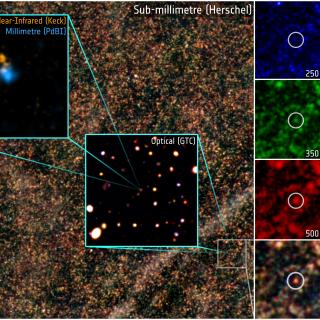Bibcode
Gorosabel, J.; de Ugarte Postigo, A.; Castro-Tirado, A. J.; Agudo, I.; Jelínek, M.; Leon, S.; Augusteijn, T.; Fynbo, J. P. U.; Hjorth, J.; Michałowski, M. J.; Xu, D.; Ferrero, P.; Kann, D. A.; Klose, S.; Rossi, A.; Madrid, J. P.; Llorente, A.; Bremer, M.; Winters, J.-M.
Referencia bibliográfica
Astronomy and Astrophysics, Volume 522, id.A14
Fecha de publicación:
11
2010
Revista
Número de citas
31
Número de citas referidas
27
Descripción
Context. The possible existence of a continuum encompassing the
diversity of explosive stellar deaths, ranging from ordinary supernovae
(SNe; lacking any sign of a relativistic outflow) to relativistic
hypernovae associated with energetic long duration gamma-ray bursts
(GRBs), is under intense debate. In this context, the supernova SN 2008D
associated with the X-ray transient (XT) 080109 could represent a
paradigmatic case, since it might exemplify a potential borderline
transition event. Optical polarimetric studies could contribute to shed
light on the different interpretations given in the literature for this
supernova (hereafter, SN 2008D/XT 080109). Aims: The main aim is
to infer geometric information of SN 2008D/XT 080109 through the study
of the evolution of its linear optical polarization. We also report the
polarization evolution of SN 2007uy, and discuss the properties of the
host galaxy interstellar medium (ISM) towards the XT. The final goal is
to compare the polarization properties, and therefore the geometries, of
both SNe. Methods: We present a V-band linear polarization
monitoring campaign carried out for SN 2008D/XT 080109 and SN 2007uy,
which shone for weeks contemporaneously in NGC 2770. This fortunate
coincidence brought us the opportunity to observe both objects
simultaneously, and most importantly, with identical instrumental
setups. The observations span 74.9 days, starting 3.6 days after the XT
and are distributed in 11 visits. In addition we performed observations
in the millimetre (mm) range in order to identify the dominant origin of
the observed polarization. Results: We report positive linear
polarization detections at several epochs for SN 2008D/XT 080109 at a
level of ~1%. For SN 2007uy the measured polarization is around ~1.5%.
In both cases the observed linear polarization seems dominated by the
host galaxy interstellar polarization (HGIP), especially for the case of
SN 2007uy. SN 2007uy shows Stokes parametres consistent with no time
evolution, which could be described by the HGIP plus a constant
eccentricity expansion on the sky plane. Over the course of our
observations of SN 2007uy, we find that its total polarization signal
does not change by more than 0.29% with a 90% confidence interval.
Despite the dominant HGIP, a statistical analysis of the distribution of
the SN 2008D/XT 080109 Stokes parametres suggests that it could show a
possible intrinsic variable polarization component. Moreover, assuming
the polarization signal from SN 2007uy is constant, we find that the
temporal evolution of the intrinsic SN 2008D/XT 080109 polarization
could be explained by an aspherical axisymmetric expansion with variable
eccentricity, although other more complex geometric scenarios are also
compatible with the data. We come to the same result even if we make no
assumption on the SN 2007uy Stokes parametres, although at a lower
significance level. Conclusions: We conclude that the data seem
to suggest a potential symmetry axis for SN 2008D/XT 080109, which is
reinforced when SN 2007uy is assumed to have constant Stokes parametres
and used as reference star. We suggest that at least the projected, if
not the intrinsic, geometry of SN 2008D/XT 080109 and SN 2007uy could be
different.
Proyectos relacionados

Formación y Evolución de Galaxias: Observaciones Infrarrojas y en otras Longitudes de Onda
Este grupo desarrolla varios proyectos extragalácticos en diferentes rangos del espectro electromagnético utilizando satélites y telescopios en tierra para estudiar la evolución cosmológica de las galaxias y el origen de la actividad nuclear en galaxias activas. En el aspecto instrumental, el grupo forma parte del consorcio internacional que ha
Ismael
Pérez Fournon